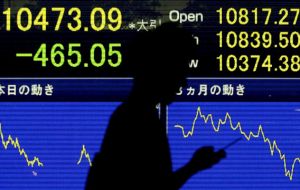MercoPress. South Atlantic News Agency
Confidence crisis and investor panic tsunami hits world
 Tokio negative close 3% but Europe is recovering this morning
Tokio negative close 3% but Europe is recovering this morning Asian stock markets early Tuesday opened down sharply amid investor panic that global government action might not be enough to stem the financial crisis.
Japan's Nikkei index plunged more than 5% - shattering the psychological 10,000-point barrier for the first time in nearly five years - before rallying. Share prices in China, Taiwan and South Korea also dropped. The main US index earlier fell 8% before bouncing back but also rested below 10.000. EU finance ministers are to meet in Luxembourg later to discuss the crisis. Having tumbled 5% on Monday, China's main stock index opened more than 3% lower on Tuesday. Taiwanese stocks dropped nearly 3% in early trading, while Australia's financial market also suffered. In Tokyo, the benchmark Nikkei was down 2.3% in early trading. Companies relying on exports have been hardest hit by the latest plunge, with shares in the electronics giant Sony trading at their lowest price for five years. The continued financial turmoil comes despite the 700 billion US dollars US bank bail-out, and efforts by several European and Asian governments to protect their banks. US President George W Bush has said it will take some time for the rescue plan to restore confidence to the financial system. EU leaders have issued a joint statement saying they would take the necessary measures to protect both Europe's banking system and individual depositors. The strains threatening Europe's economies have been felt most acutely in Iceland, where Prime Minister Gier Haarde made a national address warning his country it faced national bankruptcy. The BBC's Ray Furlong in Reykjavik said the tone was, at times, apocalyptic. In a late-night session, parliament passed emergency legislation to shore up the country's banking system after the national currency, the krona, fell 30% against the euro on Monday. In the US, both Mr Bush and Ben Bernanke, the chairman of the US Federal Reserve, are scheduled to speak later about the ongoing economic crisis. As one of the first effects of the bail-out bill passed late last week, the Federal Reserve announced it would start paying interest on the reserves that banks are forced to deposit at the central bank. Meanwhile, Congress has begun hearings into the cause of the financial meltdown that triggered the rescue plan. Richard Fuld, the head of collapsed US investment bank Lehman Brothers, told lawmakers he took full responsibility for its collapse, but wondered why the government did not come to the rescue. He said federal regulators knew his firm had, like others, been caught up in a financial tsunami emanating from the mortgage markets. But Henry Waxman, chairman of Congress's investigating panel, said Mr Fuld had profited from taking risks with other people's money and that taxpayers are having to bail out the economy as a result. The day after Lehman filed for bankruptcy, the government bailed out the insurance giant AIG, saying it was too big to fail. AIG executives are also testifying. The FBI is looking at Lehman, AIG and US mortgage giants Fannie Mae and Freddie Mac as part of a probe into possible corporate fraud. Meanwhile US utility companies reported a record rise in the number of customers defaulting on their gas and electricity bills. The largest increase in power cut-offs were in the states of Michigan (22%) and New York (17%), although rises were also reported in Pennsylvania, Florida and California. Across Europe, central banks have already offered more than 74 billion in short-term loans to banks in an attempt to make cash available. But while the idea of a European fund to rescue troubled banks has been floated, it has attracted too little support to go any further, says the BBC's economics correspondent Andrew Walker in Washington. He also says the financial crisis will come under the microscope at the International Monetary Fund meetings in Washington in the next week. Its analysts will say the global economy has been sandbagged by high commodity prices, the housing slump and the growing financial crisis. IMF economists have already warned of an increased risk of a severe and protracted economic downturn. On Tuesday a banking reform bill is due to go before the UK parliament while German lawmakers are scheduled to hold an emergency session. Germany has alarmed European investors with its increased 50 billion Euro bail-out of Hypo Real Estate, the country's second-biggest commercial property lender. It also appeared to announce an unlimited guarantee for private savings - though it later said this was not the case and it had instead given only a "political commitment" that savers would not lose deposits.




Top Comments
Disclaimer & comment rulesCommenting for this story is now closed.
If you have a Facebook account, become a fan and comment on our Facebook Page!